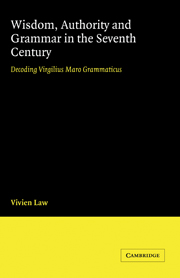Book contents
- Frontmatter
- Contents
- Preface
- Abbreviations
- Introduction
- 1 The outer layers: parody and word-play
- 2 The wisdom tradition
- 3 Avarice and the four keys to wisdom
- 4 The multifarious nature of wisdom
- 5 Heretical knowledge? The constitution of man
- 6 The Epistolae: Virgilius' Retractatio?
- 7 Concealment of mysteries: the techniques of secrecy
- 8 Virgilius and the seventh century
- 9 Conclusion
- Appendix 1 Epistola II 14-93: The vocative of ego
- Appendix 2 Epitome XV: The catalogue of grammarians
- Notes
- Works cited
- Index
5 - Heretical knowledge? The constitution of man
Published online by Cambridge University Press: 10 November 2009
- Frontmatter
- Contents
- Preface
- Abbreviations
- Introduction
- 1 The outer layers: parody and word-play
- 2 The wisdom tradition
- 3 Avarice and the four keys to wisdom
- 4 The multifarious nature of wisdom
- 5 Heretical knowledge? The constitution of man
- 6 The Epistolae: Virgilius' Retractatio?
- 7 Concealment of mysteries: the techniques of secrecy
- 8 Virgilius and the seventh century
- 9 Conclusion
- Appendix 1 Epistola II 14-93: The vocative of ego
- Appendix 2 Epitome XV: The catalogue of grammarians
- Notes
- Works cited
- Index
Summary
We cannot think about language without making some assumptions about the nature of man. Usually implicit, as often as not unconscious, our picture of the human being rebounds upon our view of language, shaping it to conform to our mental image of its speakers. For instance, from Augustine on, many a thinker has drawn a parallel between the division of man into soul and body, and that of language into meaning and sound. Augustine set it out in De quantitate animae thus: ‘Since the word consists of sound and meaning, and sound pertains to the ears whereas meaning pertains to the mind, don't you think that in the word, as in any living creature, the sound is the body and the meaning the soul of the sound, as it were?’ (xxxii 66). Reiterated by one medieval writer after another, this sentiment found expression even in the seventeenth century in the writings of the Cartesian philosopher Cordemoy. Tempting as it is to regard such remarks as a mere conceit, their implications reach far into the development of language study. Medieval thinkers regarded the body as an encumbering source of sin, an obstacle to salvation, and popular devotional literature is rife with tales of saintly asceticism. Medieval scorn for the flesh finds its linguistic counterpart in the reluctance to focus on the ‘physical’ aspects of language — sounds and sound-systems, word-formation and inflection. The subdisciplines of phonetics, phonology and morphology are all of Renaissance or later origin.
- Type
- Chapter
- Information
- Wisdom, Authority and Grammar in the Seventh CenturyDecoding Virgilius Maro Grammaticus, pp. 57 - 76Publisher: Cambridge University PressPrint publication year: 1995

